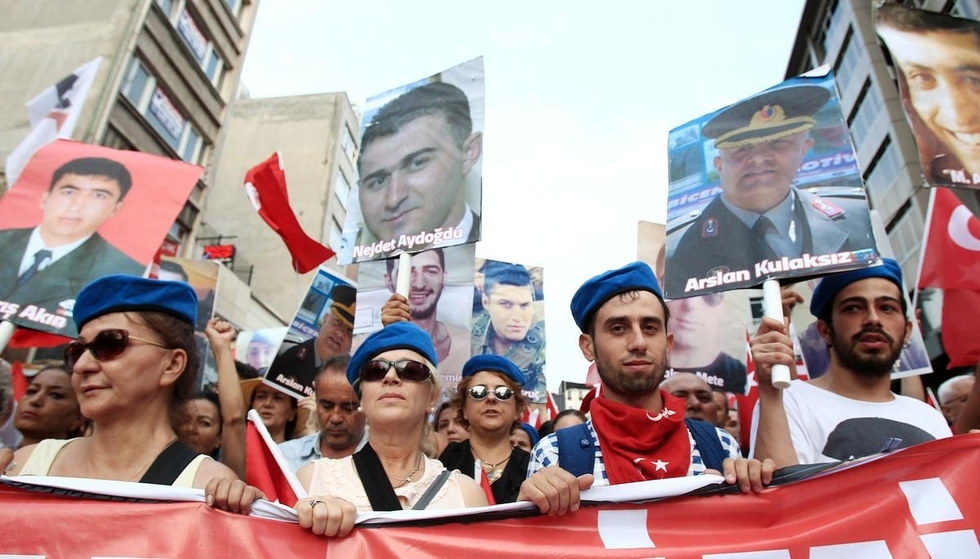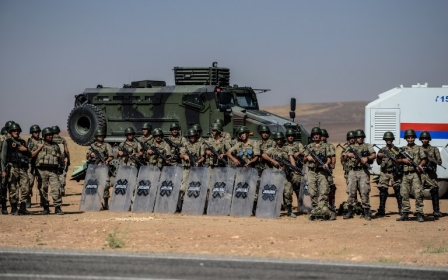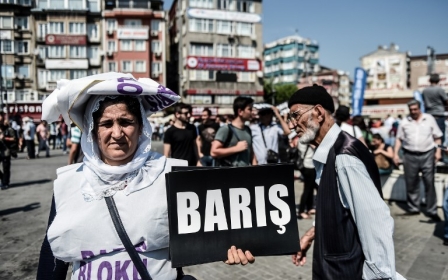Turkey's clash with PKK is polarising society ahead of new polls

Sunday’s killings by the PKK of 16 Turkish soldiers, including a colonel commanding a battalion, in what seems to have been a highly skilled multiple-stage ambush, opens a new and grim period in Turkish politics in which the main casualties are likely to be the moderates on the political scene.
If there was any doubt about this, two items of news on Tuesday morning added to fears about the country’s future. In Igdir, a north-eastern province on Turkey’s border with Armenia, at least 12 policemen were killed in another ambush. At the same time, the People’s Democratic Party (HDP), the moderate pro-Kurdish party which a year ago was playing the role of go-between in the now defunct peace process between government and Kurds, revealed that 126 of its branch offices across Turkey have faced attacks in the last 48 hours. Just as the campaign opens for a second general election this year to resolve the country’s political deadlock, the killings have sparked political polarisation and demonstrations.
These military setbacks are not entirely unprecedented: a multiple attack in 2011 killed 24 troops; 12 Turkish soldiers were killed in this area in an ambush in March 2007 and the PKK claimed larger numbers of victims on at least two occasions in the 1990s. Despite continual bombings by Turkish air force jets of PKK outposts in Turkey and northern Iraq since 25 July, the Daglica and the Igdir attack show that the scale of PKK attacks, and the casualties they claim, are growing.
But the high profile of the latest outrages means that their political impact has been vastly greater than in the past. On Sunday evening when the news was announced, the prime minister returned to Ankara from Konya where he had been watching Turkey’s national football team defeat the Netherlands. He summoned a late-night meeting of Turkey’s security ministers, commanders, and secret service to discuss the situation. A second such meeting was held late on Monday in the presidential palace. President Erdogan and the prime minister both pledged to strike against the PKK and root it out with even tougher military and police measures against the Kurdish separatist group.
The public was not given figures for the death toll until 24 hours after the ambush and this ramped up alarm and speculation. On Sunday evening there were protests and demonstrations in several Turkish towns by flag-waving nationalists. Supporters of the AKP and President Erdogan, chanting slogans, protested outside the offices of Hürriyet, a large newspaper which is one of the president’s main critics. A public prosecutor is now considering launching a case against the paper on the grounds that it may have distorted the president’s words.
If public opinion in western and central Turkey is angry and alarmed by the PKK violence, the situation in the predominantly Kurdish south-east is even more dismaying. In what seems like an effort to regain full government control over disaffected towns, large-scale police operations were launched in Diyarbakir and Cizre on Friday and carried on throughout the weekend under a curfew. There seem to have been frequent clashes between the local population and the authorities.
On Sunday, an MP for the pro-Kurdish HDP claimed that there had been at least three deaths in Cizre, a particularly troubled town close to Turkey’s borders with Syria and Iraq. A group of HDP deputies were refused entry to Cizre and claimed they had even come under police fire.
Left-of-centre Kurds were not the only ones to feel alarm. The pro-Islamist Kurdish TV station, Rehber TV, noted for strong hostility to the PKK, reported on Sunday evening “violence and chaos” in the streets, showing deserted houses, tyres burning on sidewalks, and armoured police vehicles patrolling empty streets, filled only with clouds of tear-gas. Huda Par, an Islamist Kurdish Party often criticised for its allegedly combative political style, called for an end to the violence.
There is no sign of that happening. The PKK and government now seem set for a conflict, one which neither side can expect to win in the short term and which could go on for years. The ambushes at Daglica and Igdir signal clearly that the PKK, or at least its military wing in the far east of Turkey, is not interested in any kind of settlement.
It may well be the case that, as Kadri Gursel, a leading Turkish secularist commentator, tweeted on Monday morning, the Daglica ambush shows that the PKK no longer wants a peace deal and is bent on full "separation," no matter how dreadful the cost to all sides.
With neither side willing to back down, Turkey (which retains the strong backing of the United States and Western politicians for its fight against the PKK) and the international community could face a long and debilitating struggle which would inevitably have a serious impact on its efforts to defeat Islamic State (IS).
However, PKK violence is undoubtedly helping rally grass roots support among conservative Turks for President Erdogan and the AKP. Moderate Kurds of the HDP are now sidelined. Their condemnations of the violence risk appearing meaningless and ineffective while they themselves are becoming a lightning conductor for attacks from crowds of angry Turkish nationalists across the country.
Until a week ago, the most reliable Turkish polls suggested that voters in the country were still deadlocked as they were in the June elections. But that could be changing now. If voters move away from the HDP or other opposition parties, the chances of the AKP regaining its majority will rise, particularly if the HDP was to drop below the 10 percent barrier and fail to get into parliament.
Meanwhile Turkey could face a harsher more authoritarian style of government amid disorders which some people openly fear could make holding of normal elections very difficult.
- David Barchard has worked in Turkey as a journalist, consultant, and university teacher. He writes regularly on Turkish society, politics, and history, and is currently finishing a book on the Ottoman Empire in the 19th century.
The views expressed in this article belong to the author and do not necessarily reflect the editorial policy of Middle East Eye.
Image: Hundreds of people attend a protest rally in Istanbul on 7 September, 2015 against the bomb attack perpetrated by PKK, which killed 16 soldiers and wounded six in Daglica in the southeastern province of Hakkari on 6 September, 2015. (AA)
Middle East Eye propose une couverture et une analyse indépendantes et incomparables du Moyen-Orient, de l’Afrique du Nord et d’autres régions du monde. Pour en savoir plus sur la reprise de ce contenu et les frais qui s’appliquent, veuillez remplir ce formulaire [en anglais]. Pour en savoir plus sur MEE, cliquez ici [en anglais].





